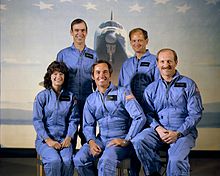 Challenger as photographed by the SPAS-1 satellite on June 22, 1983 | |
| Names | Space Transportation System-7 |
|---|---|
| Mission type | |
| Operator | NASA |
| COSPAR ID | 1983-059A |
| SATCAT no. | 14132 |
| Mission duration | 6 days, 2 hours, 23 minutes, 59 seconds |
| Distance travelled | 3,570,000 km (2,220,000 mi) |
| Orbits completed | 97 |
| Spacecraft properties | |
| Spacecraft | Space Shuttle Challenger |
| Launch mass | 113,025 kg (249,177 lb) |
| Landing mass | 92,550 kg (204,040 lb) |
| Payload mass | 16,839 kg (37,124 lb) |
| Crew | |
| Crew size | 5 |
| Members | |
| Start of mission | |
| Launch date | June 18, 1983, 11:33:00 UTC (7:33 am EDT) |
| Launch site | Kennedy, LC-39A |
| Contractor | Rockwell International |
| End of mission | |
| Landing date | June 24, 1983, 13:56:59 UTC (6:56:59 am PDT) |
| Landing site | Edwards, Runway 15 |
| Orbital parameters | |
| Reference system | Geocentric orbit |
| Regime | Low Earth orbit |
| Perigee altitude | 299 km (186 mi) |
| Apogee altitude | 307 km (191 mi) |
| Inclination | 28.30° |
| Period | 90.60 minutes |
| Instruments | |
| |
 STS-7 mission patch  From left: Ride, Fabian, Crippen, Thagard and Hauck | |
STS-7 was NASA's seventh Space Shuttle mission, and the second mission for the Space Shuttle Challenger. During the mission, Challenger deployed several satellites into orbit. The shuttle launched from Kennedy Space Center on June 18, 1983, and landed at Edwards Air Force Base on June 24, 1983. STS-7 carried Sally Ride, America's first female astronaut.